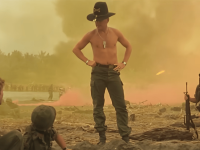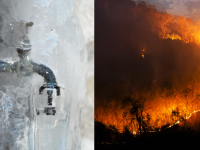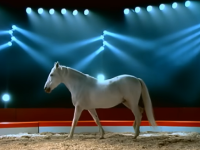Interview. Cara Delevingne, Ready to Conquer Hollywood, Immerses Herself in ‘Paper Towns’

SUPERMODEL. “There was a point in my life where I literally lived through a camera.” Cara Delevingne, a confident tangle of lanky limbs and messy hair, tattoos and ripped black jeans, arched her eyebrows and popped her eyes wide as she excitedly described her habit of filming her meteoric, globe-trotting rise.
“Watching Lars Ulrich play a Metallica show from behind the drum kit! Or doing tequila shots with Whitney Houston just before she died! When I get older, I’m going to go through that footage and have the best time, because I probably won’t remember much of it.”
For her next adventure, the unfiltered Ms. Delevingne, at 22 the reigning “It” Brit supermodel, is planting her Union Jack in Hollywood with a much-coveted part in “Paper Towns“ (due Friday), the second film based on a novel by John Green, whose “The Fault in Our Stars“ became a $300 million hit worldwide and helped make Shailene Woodley a star.
You don’t have to be one of Ms. Delevingne’s more than 15 million Instagram followers to see why she was a good fit for the role of the rebellious teenager Margo Roth Spiegelman. In “Paper Towns,” the character is described by her neighborhood admirer as “arguably the most gorgeous creature God had ever created,” a girl “whose life is a series of unbelievably epic adventures.” Ms. Delevingne has been a professionally gorgeous model for Burberry and other brands, an angel for Victoria’s Secret, and, most recently, the windswept cover girl of the July issue of Vogue.
But Ms. Delevingne is hardly the only attractive young woman in Hollywood, and she is certainly one of the least experienced. Moreover, in Hollywood, where nearly every lead actor, male or female, is also a fashion model — often making far more money on commercial endorsements than cinema — models are regarded with unease, and often for good reason. Ms. Delevingne understands. She recalls running into the fellow supermodel Rosie Huntington-Whiteley at the Met Ball, shortly after she was cast in “Transformers: Dark of the Moon.”
“She was like, ‘Well, I just kind of got offered it!’ “ Ms. Delevingne recalled on a May afternoon in the lobby of the Mercer Hotel in SoHo. “I love Rosie, but I was like, ‘I would bite someone’s head off to do that!’ “
The director Jake Schreier said that 150 to 200 actresses vied for the part of Margo and that like many of them, Ms. Delevingne had to audition.
In her tryout scene, Quentin (Q for short), the neighbor played by Nat Wolff, confesses that he has loved Margo for years, even though he has primarily observed her escapades from across the street. “You love me?” Margo answers. “You don’t even know me.”
Mr. Schreier asked Ms. Delevingne to deliver that line, but then improvise the rest of the scenario as herself, and the actress’s knowing ad-libbed performance struck such a nerve that both she and Mr. Wolff left the audition crying. Ms. Delevingne won the job in part because of her chemistry with Mr. Wolff, but largely because of her deep-rooted empathy for the character.
“Obviously, in some outsized global way, Cara’s lived a lot of what Margo’s going through,” Mr. Schreier said.
Ms. Delevingne, whose anecdotes are almost always salted with joyful profanity, explained: “I wanted to be Margo so badly because I’ve said that exact thing to someone telling me they’re in love with me. Like: Whatever you think I am is a complete projection of who I am. And I actually have no idea who I am! So how do you know?”
Already, the Variety critic Justin Chang has raved that Ms. Delevingne is “the real find of the film” and that “on the evidence of her work here, this striking actress is here to stay.”
Margo’s creator, John Green, wrote via email that the actress “captured the disconnect” between Q’s image of Margo and her image of herself. “She understands better than anyone I’ve ever known what it’s like to have people look at you and think they know you when in fact almost no one is actually listening to you,” he said. “I do think Cara and Margo both deflect and distract. Maybe this is a response to the pressures they both feel from the outside world — pressures to live up to other people’s expectations or constructions — and maybe it is also a response to something from within: Pain that feels too overwhelming or terrifying to lay bare.”
Ms. Delevingne was raised in a privileged but hardly picture-perfect family in London. Joan Collins is her godmother. Her father, Charles, is a successful real estate developer. Her mother, Pandora, is working on a memoir about her long-term heroin addiction.
“I went through so much therapy as a kid, and I hated it, and because you get so used to saying the same thing over and over again, it just becomes a story,” she said, adding later: “I always wanted to act, from when I was 4 years old. When I was younger, I hated myself, so I preferred being other people.”
Ms. Delevingne made her modeling debut in a Vogue Italia shoot with Bruce Weber at the age of 10 in 2003, signed with the prestigious Storm Model Management in 2009 and took home Model of the Year at the British Fashion Awards in 2012 and 2014. Her rise couldn’t have been more swift or seemingly exuberant, with Karl Lagerfeld calling Ms. Delevingne — known for making faces and sticking her tongue out — the “Charlie Chaplin of the fashion world.”
“Modeling was never a dream of mine,” Ms. Delevingne said, noting that besides acting, making music was a long-term goal. “But when I start something, I want to prove people wrong. I thought: I’m going to smash this as hard as I can.”
Ms. Delevingne said the work “was killing my soul.” She developed acute psoriasis, which she attributed to stress and exhaustion. “It’s the lemon effect,” she said, shrugging. “I’ll pick you up, squeeze everything I can out of you and throw you away for the next one.”
While modeling, she took an acting course in London with “this Russian man who was a student of a student of Stanislavsky, and it was basically therapy,” she said.
She had just begun that move into acting when her near-uninterrupted run of professional good fortune hit a speed bump in 2013. She was photographed by paparazzi dropping a plastic bag of white powder on the stoop of her London home. It was her first blip of bad publicity. The fashion chain H&M never worked with her again.
“I was a kid, you know? Ms. Delevingne said, wincing a bit at the memory. “I still am in so many ways, and I’m so lucky, but I think everyone needs a bit of a slap in the face, and a reminder that no one is invincible. That’s what it was for me.”
Later, she added that “especially with young people seeing the film, I want to be clear: I’m so far away from drugs that I couldn’t possibly be further way, and whatever happened in the past is in the past, it just doesn’t exist anymore.”
Initially, Ms. Delevingne was offered the typical roles that go to moonlighting mannequins: “the part of a Swedish model or an English one, where I die all the time, or stupid girls in, like, ‘American Pie 27’ “ who performed gratuitous sex acts. “It felt crazy to turn down roles because I thought I’d do anything to be an actress, but I realized my dignity’s more important than that.”
Her first screen role, as a princess in “Anna Karenina” (2012), was the equivalent of playing the tree in the school play. “I didn’t speak and spent hours getting into hair and makeup for this big wide shot,” she said. “I got so nervous. Then the director comes up and says: ‘Stop modeling. And stop trying to look pretty.’ “
Ms. Delevingne was so thrilled to record an audition for a gritty role in an adaptation of Martin Amis’s novel “London Fields” that she cried when she got the call. Then, right before taping, Ms. Delevingne said a studio technician told her, “ ‘They’re just going for a name so they can sell the movie.’ It completely tripped me up, because that’s my worst fear,” she said, adding, “If that’s the only reason, I’d rather not get the part.”
Ms. Delevingne did get that part, along with supporting roles in “Pan,” “The Face of an Angel,” “Tulip Fever” and “Kids in Love” (not to mention a job swinging nunchucks in Taylor Swift’s “Bad Blood“ video). Ms. Delevingne has booked her next lead in Luc Besson’s big-budget science-fiction “Valerian” and has recently been playing the supervillain Enchantress in David Ayer’s DC Comics 2016 tent pole “Suicide Squad,” for which she has prepared by silently imagining ways to kill her friends.
“I’ll be in a group of people, thinking as this evil, twisted woman, of people exploding, or cutting them up,” she said, curling her lip into a comical snarl, before breaking back into a grin. “It works.”
This month, Ms. Delevingne formalized her move away from fashion byparting ways with Storm Model Management. She will continue to model, but selectively. “I love saying no,” she said. “Before, I didn’t, and it took a huge toll on my health and happiness.”
With “Paper Towns,” her romantic life has become a matter of even more intense public scrutiny. She has openly discussed her bisexuality, defendedsame-sex marriage and spoken about her relationship with the musician Annie Clark, who goes by the stage name St. Vincent. A recent Vogue cover article led to an online petition protesting the suggestion that her bisexuality might be a phase. Ms. Delevingne, who said she found the protest flattering, though she saw “nothing malicious” in the article itself, said: “My sexuality is not a phase. I am who I am.”
She said a major challenge of acting has been learning to block out her life’s many distractions. “Being in love helps, you know?” she said. “If you’re in love with someone, you can be with them like no one else is in the room. Acting is like that. It’s like taking that feeling and turning it on so nothing else matters when you’re looking in another actor’s face.”
Ms. Delevingne said she hoped to follow in the footsteps of Charlize Theron, who also began her career as a model. “People can put you in whatever box: model, whatever,” she said. “But if I just keep going and actually do it well, which I hope I can, then I hope people will give me more movies — and I’ll win an Oscar!”
With that, Ms. Delevingne smiled serenely.
Then she leaned back on the couch, rolled her eyes, and stuck out her tongue.










